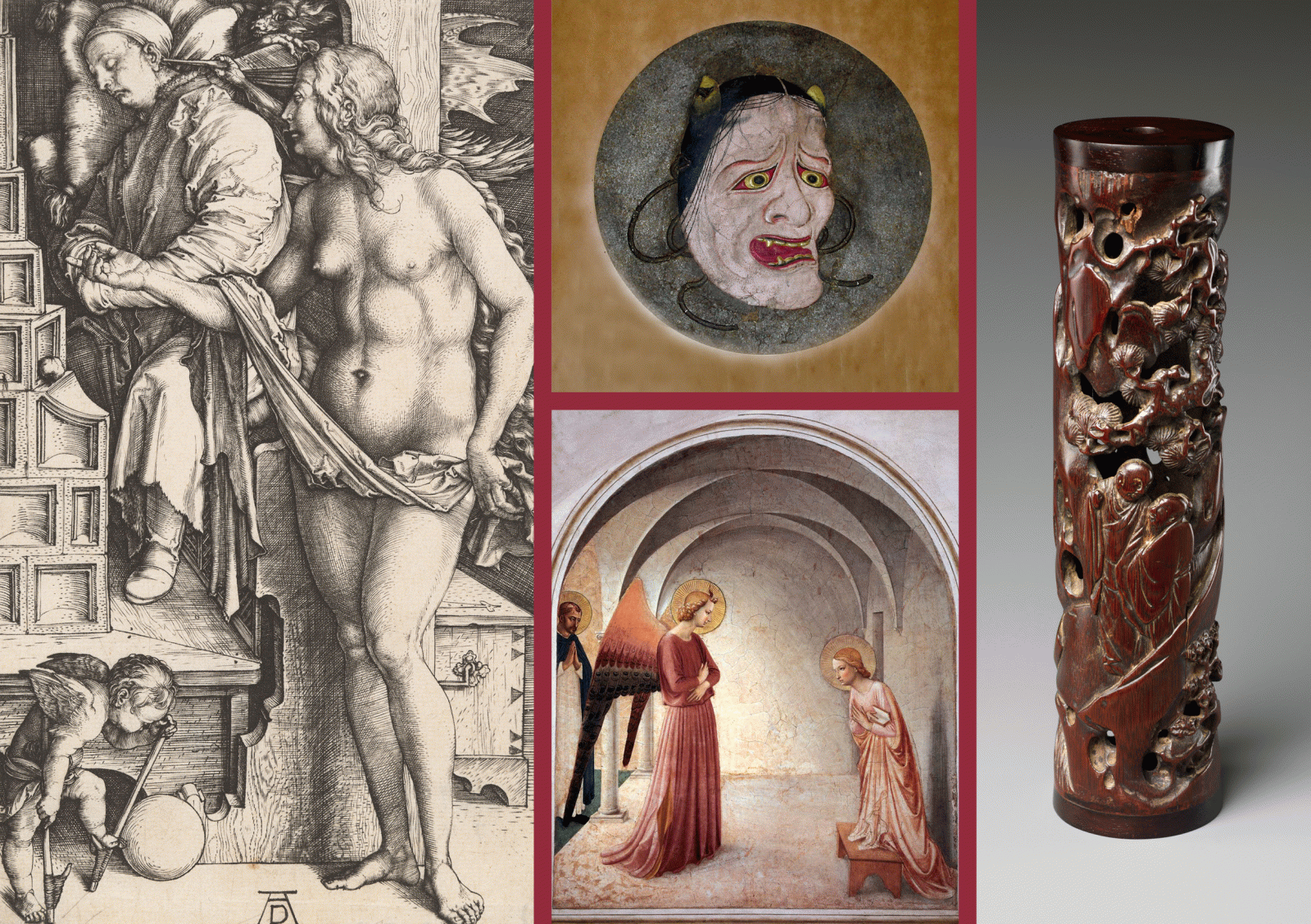Workshop
Practices of Imagination
Interdisciplinary Workshop organised by Giulia Baldelli, Hana Gründler and Jakob Moser within the framework of the Research Group "Ethico-Aesthetics of the Visual"

Clockwise from left: Albrecht Dürer, The Dream of the Doctor, ca. 1498. National Gallery of Art, Washington D. C. Source: Wikimedia Commons: https://t1p.de/ia9y ; Noh Mask of a Demoness (Hannya), Painting. H. O. Havemeyer Collection. Source: https://t1p.de/zdar ; Zhu Sansong (朱三松), Cylinder Censer with scholars in a landscape. Late 16th – early 17th century. Metropolitan Museum of Art, New York; Fra Angelico, The Annunciation, ca. 1438-50, Fresco. San Marco, Florence. Source: Wikimedia Commons: https://t1p.de/i3bf
Against the backdrop of contemporary debates over the creative potential and embodiment of cognitive processes, imagination, a concept that traditionally mediates between perception and thought, has acquired particular topicality. Whereas the positive role of imagination as productive faculty and agency of knowledge is often underlined, concomitant ethical and political problems, traceable in the longue durée of the critique of imagination, remain largely unilluminated.
In fact, the conceptual pair phantasia/imaginatio has always mediated between sensuality and intellect on the theoretical level while at the same time delineating a practical-ethical battlefield. Imagination proves itself an ambivalent faculty: It is either in the service of true knowledge and virtue or it unleashes an uncontrollable life of its own – an excess of figuration that can no longer be rationally controlled, that threatens to undermine the prevailing political, scientific, and religious systems. The excesses of imagination – which always included the physical – if not averted by censorship, were tamed by collective and individual practices in public or private space (of the imagination). At the same time, these excesses and their perilousness had constantly to be imagined and materialised in order to establish the urgency of disciplining them in the first place. The process of materialisation itself, whether in painting, writing, or the other myriad forms of expression, plays a pivotal role in this.
The workshop aims to explore this reciprocal relationship between the excesses and disciplining exercises of the imagination. The focus will be on the epochal transition from the late Middle Ages to the early modern period, but there will also be a few outlooks into the 20th century. The purpose of the workshop is not to arrive at an exhaustive historical reconstruction of theories of imagination and imaginary practices. Rather, we hope to tease out the ethical-aesthetic, artistic, and political dimensions that have been overlooked in previous historically oriented considerations of the concept. It is therefore more a matter of critically analysing how ruling societies have often misused the category of the imaginative in order to stigmatise and discipline unruly or intransigent “others”. Indeed, the demarcation between the legitimately imaginable and the unimaginable is not confined to private cognitive and meditative practice, but encompasses rituals, ways of speaking, ways of remembering, multiple ways of generating knowledge, artistic production and reception, configurations of public space or everyday objects.
Program
Thursday, 25 November, 2pm – 7.30pm
2pm – 2.30pm Welcome (Giulia Baldelli, Hana Gründler and Jakob Moser) and introduction (Hana Gründler)
Magical Influences (Moderation Jakob Moser)
2.30pm – 3.15pm The Strange Case of Transitive Imagination – Tonino Griffero
3.15pm – 4pm Practicing Imagination: Jacob Boehme’s ›Text‹ Production – Giulia Baldelli
Break
Excess and Reduction (Moderation Milica Prokić)
4.30pm – 5.15pm Terror, Imagination, and Image-Making in Egyptian Monastic Practices – Ravinder Binning
5.15pm – 6pm A Hannya Manifesto – Posthuman Manifestations of Female Demons – Wiebke Leister
6pm – 6.45pm »Das-ohne-Namen-und-ohne-Form«. Kritik der Einbildungskraft bei Simone Weil und Fra Angelico – Philipp Kaspar Heimann
Break
7pm – 7.30pm Discussion
Friday, 26 November, 2pm – 7pm
Meandering and Imagination (Moderation Linda Müller)
2pm – 2.45pm Holes, Miniatures and Incense Burners – Imagination and Visualisation in China – Ning Yao
2.45pm – 3.30pm Pen-Wanderings: Mind Alteration and Sixteenth-Century Drawing Practices – David Zagoury
Break
Poetologies and Phantasies (Moderation Giulia Baldelli)
4pm – 4.45pm Michel de Montaigne. Konzepte der Imagination – Karin Westerwelle
4.45pm – 5.30pm Gibt es eine epikureische phantasía in der Kunst der Frühen Neuzeit? – Jesús Muñoz Morcillo
5.30pm – 6.15pm Practices of Figuration and the Space of Imagination – Niklaus Largier
Break
6.30pm – 7pm Discussion
Saturday, 27 November, 2pm – 6.15pm
Phantasmagories and Subjectivity (Moderation Hana Gründler)
2pm – 2.45pm Practices of Imagination in Gianfrancesco Pico della Mirandola’s De imaginatione – Jakob Moser
2.45pm – 3.30pm Imagination und anthropologische Topik. Die Entstehung der Welt und der Subjektivität von Alberti zu Descartes – Fausto Fraisopi
Break
Play and Control (Moderation Giovanna Targia)
4pm – 4.45pm Controlling Love, Imagination and Poetry in Dante’s Vita Nova – Rebecca Bowen
4.45pm – 5.30pm The Interplay of Memory, Imagination and Pedagogy in Fifteenth-Century Mantua – Valentina Cacopardo
Break
5.45pm – 6.15pm Discussion
Registration link: https://zoom.us/meeting/register/tJAocu2vrTgiGdWsQWO8bZzZ6z4PGN_9iRiT
Downloads
25. – 27. November 2021
This event will take place online.
To participate please register in advance via Zoom:
https://zoom.us/meeting/register/tJAocu2vrTgiGdWsQWO8bZzZ6z4PGN_9iRiT
After registering, you will receive a confirmation email containing information about joining the meeting.
Hinweis
Diese Veranstaltung wird durch Fotografien und/oder Videoaufnahmen dokumentiert. Falls es nicht Ihre Zustimmung findet, dass das Kunsthistorische Institut in Florenz Aufnahmen, auf denen Sie erkennbar abgebildet sein könnten, für die Veranstaltungsdokumentation und Öffentlichkeitsarbeit (z.B. Social Media) verwendet, bitten wir um eine entsprechende Rückmeldung.


